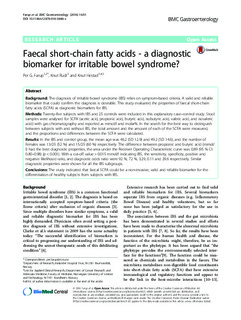Faecal short-chain fatty acids - a diagnostic biomarker for irritable bowel syndrome?
Journal article, Peer reviewed
Permanent lenke
http://hdl.handle.net/11250/2413233Utgivelsesdato
2016Metadata
Vis full innførselSamlinger
Sammendrag
Background
The diagnosis of irritable bowel syndrome (IBS) relies on symptom-based criteria. A valid and reliable biomarker that could confirm the diagnosis is desirable. This study evaluated the properties of faecal short-chain fatty acids (SCFA) as diagnostic biomarkers for IBS.
Methods
Twenty-five subjects with IBS and 25 controls were included in this explanatory case–control study. Stool samples were analysed for SCFA (acetic acid, propionic acid, butyric acid, isobutyric acid, valeric acid, and isovaleric acid) with gas chromatography and reported as mmol/l and molar%. In the search for the best way to distinguish between subjects with and without IBS, the total amount and the amount of each of the SCFA were measured, and the proportions and differences between the SCFA were calculated.
Results
In the IBS and control group, the mean age was 46.2 (SD 12.9) and 49.2 (SD 14.6), and the number of females was 13/25 (52 %) and 15/25 (60 %) respectively. The difference between propionic and butyric acid (mmol/l) had the best diagnostic properties, the area under the Receiver Operating Characteristic curve was 0.89 (95 % CI: 0.80–0.98) (p < 0.001). With a cut-off value > 0.015 mmol/l indicating IBS, the sensitivity, specificity, positive and negative likelihood ratio, and diagnostic odds ratio were 92 %, 72 %, 3.29, 0.11 and 29.6 respectively. Similar diagnostic properties were shown for all the IBS subgroups.
Conclusions
The study indicated that faecal SCFA could be a non-invasive, valid and reliable biomarker for the differentiation of healthy subjects from subjects with IBS
